
Index:
UPDATED ✅ Do you want to know more about podcasting and the benefits of creating a podcast? ⭐ ENTER HERE ⭐ and Learn Everything From Scratch ⭐
Worldwide, podcasting is becoming one of the best ways to highlight any type of content above the competition. Well, being a different format that is more practical for users, it has exceeded the expectations of many.
Indeed, those who still don’t know how it worksare showing more and more interest in knowing what it is, what its advantages are, how it differs from radio and How do you create this type of content?.
Therefore, next, We will highlight all this information in detail so that you are encouraged to build your own podcast.. Reason why, we will also mention the best platforms to host an audio-on-demand program.
What is podcasting?
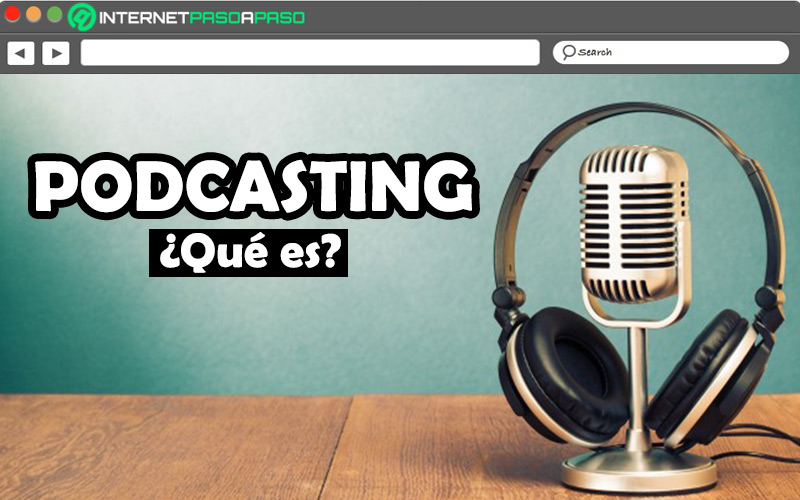
Being the abbreviation of Pod that comes from “iPod” and the one of Broadcast that means “spread or transmit”the term arises podcasting which refers to the process through which an individual or a group of people are responsible for preparing content in audio format for upload it on the Internet and transmit it to other people.
In other words, it consists of the regular distribution of pre-recorded audio programs over the Internet that can be heard at any time, i.e. on demand. This, through a syndication system or archive (such as the RRS channel) that allows downloads and reproductions at the user’s pleasure.
In that sense, podcasting encompasses the process of making and distributing audio files with defined periodicity and vocation for continuity which is led by podcasters. Being these, the people focused on fulfilling all the tasks required to provide podcasts that are characterized by having a digital audio where voice, music and sound effects are combinedto deal with a wide variety of topics.
Benefits of podcasting
Basically podcasting used to publish content in audio format that is created with the aim of satisfying a need of a certain sector of the population. A) Yes, It is considered as an excellent method to deliver valuable content to the audience. And till insert advertising to obtain higher profits. But, beyond identifying its usefulness, it is appropriate to know what are the main pros of podcasting for both the sender and the receiver.
Therefore, below, we highlight the benefits of great interest in this regard:
Advantages for broadcasters (or podcasters):
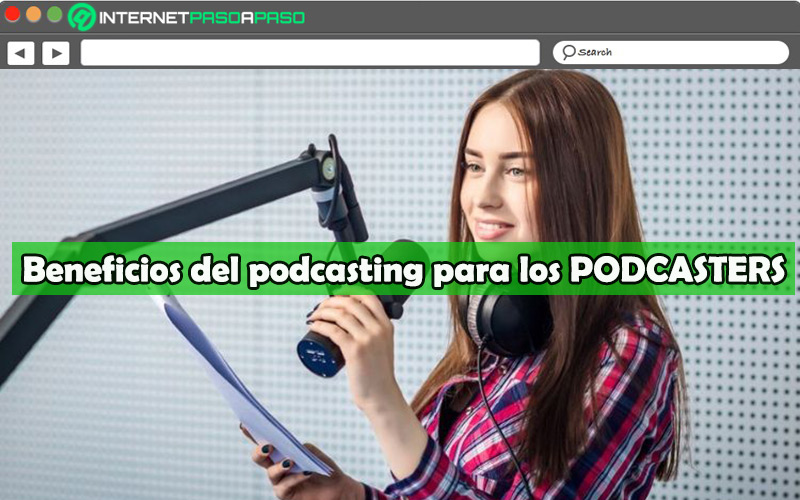
The best that podcasting offers for those who create and spread it, can be summarized in the following points:
- It is ideal for position yourself as an expertsince having a podcast is ideal to propel you to the pinnacle of expertise more quickly and effectively compared to other types of content.
- It allows raise visibility, credibility and authority in the sectorbecause it is suitable for reaching a wider audience with the aim of becoming a benchmark.
- reveals less competition and thus, it helps to contribute more originality. Since, despite its boom, it is still a market that is growing and attracts more and more interested parties, so you have to take advantage of the opportunity.
- create a podcast it is cheaper to make content in another format. Besides, it does not require sophisticated equipment and both its production and dissemination is easy.
- It qualifies as one of the strongest trends to develop content and obtain optimal results around the visits in a very short time. Thanks to the fact that it is fashionable.
- Naturally, it brings words to life and breaks down potential virtual barriers. Thus, making use of the voice, you can achieve a more positive impact on your audience and build loyalty with ease.
- It allows gain new income through the promotion of products, the disclosure of services, sponsorships, etc. Which, increases as the popularity of your audio program increases.
- It is valuable for networkingin order to locate new contacts, forge alliances and hold more benefits in a productive way.
Advantages for receivers (or listeners):
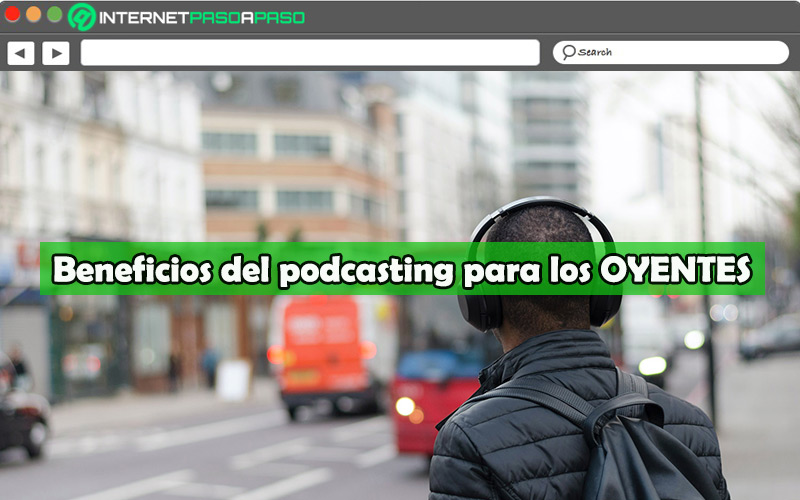
In the case of the audience of podcasts, they can obtain the following pros when consuming this type of content:
- It is highly flexiblesince it does not have a strict transmission schedule and each user can adapt it to their working hours or daily routines.
- Thanks to the fact that it supports the download of audio files, you can easily listen to them No internet connection to make your consumption offline whenever you want.
- It is usually a completely free service and so, guarantees remarkable accessibility. Also, although there are exceptions, they will never reveal an exaggerated cost.
- It is a content format. useful to optimize time. Since, as it can be heard from anywhere, at any time and even while performing other tasks; It does not reflect a waste of time.
- Podcasting focuses on providing highly specialized content to provide valuable and experienced information. which, it turns out inspiring and even educational for listeners.
- also allows gain constant learning in each of the episodes of these programs. This, at the same time, helps your brain stay active with all the information it receives.
- Tends to improve mental abilitiessuch as memorization, attention, auditory learning, etc.
- Guarantees content diversity; Currently, you can find countless podcasts and explore multiple catalogs that will surely satisfy your tastes.
Differences between podcasting and radio
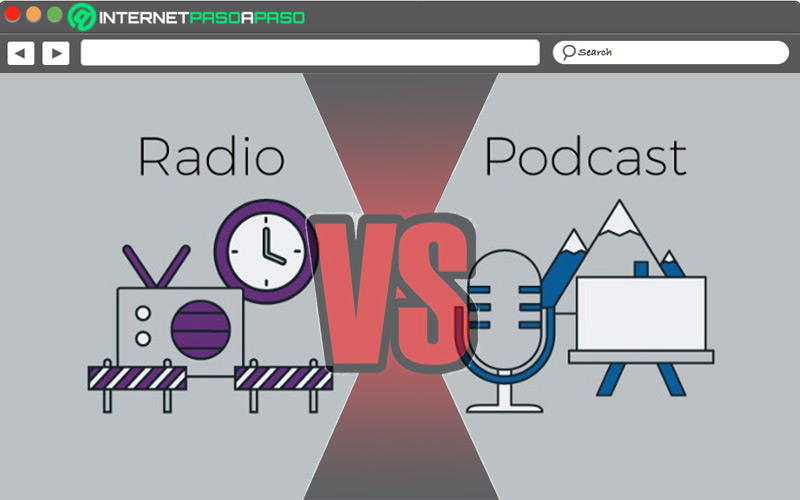
Prior to learn how podcasting worksmany Internet users make the mistake of assuming that it is the same as the radio and the truth is that nothing is further from reality.
Therefore, it is necessary to point out the most important differences between radio and podcasts:
time constraints
inherently, time management on the radio is strict. Since there are always time commitments, it is mandatory to go to a commercial break, move on to another program and, ultimately, comply with the established schedule. In contrast, podcasting is free from time constraints. So, they do not have a specific duration and can be carried out at the pace desired by their own creator and/or conductor.
power of choice
Radio listeners should engage with what they find at a specific time on the available radio stations, since it is always on the air and there is no way to delay or stop it to listen to the program from its beginning. In addition, due to its lack of continuity, it is usually repetitive with information.
This, unlike the podcast, which is achieved through various platforms with extremely varied catalogs in which you can choose the theme and even the episode you want to listen to, at any instant of time. Either from the beginning or in any part of the audio program because there is the option to move them forward or back.
The audience
Although it is true, the radio is obliged to attract a wide audience because it consists of a mass communication medium that, despite the fact that it segments audiences, will always be broadcasting and is powered by audience measurements.
For its part, podcasting tends to focus on niches. Taking into account that it is “narrowcasting” and focuses on interacting with small groups of people or certain niches. Which means that podcasts can focus on much narrower issues (cooking recipes, food, football, entertainment, health, politics, etc.).
how do you hear
Usually the radio is heard in car speakers as a companion to be informed and entertained at the same time, with divided attention. Whereas, podcasting is a type of content that is listened to through headphones and from anywhere, whether at home, at work, in the gym, doing homework, etc.
Freedom of expression
Radio programs have always had to take great care of their language and the content they transmit because they are spread through a mass media. In particular, because they are broadcast by means of frequencies that have been provided in concession by the State. However, in the case of podcasts, these are audio-on-demand programs that show complete freedom of expression. As a result, whoever produces and hosts it will not be exposed to legal claims for the content they provide.
Other differences…
- The radio signal is characterized by being local and present legal, technological and geographical restrictions. Unlike podcasting which is international and does not disclose such limitations.
- The content of a podcast is always available for Internet users, while that of the radio it is clearly perishable.
- In the case of radio, the director of programming has the power to decide the format and type of content that the producer must follow. However, in audio-on-demand programs the same producer can personalize the content to impact your audience according to their preferences.
- Frequently, the announcements broadcast from the radio are recorded and impersonal. Whereas, ads on podcasts are given to an engaged audience through an intimate and personalized exchange in the voice of the maintainer.
The podcast and podcasters, what role do they play in this type of content?
While Podcasting is one that encompasses the process of making and distributing of audio files, a podcast refers to each audio-on-demand program that is produced under the particularities of this type of online content.
In this sense, for their part, podcasters are the people who present these types of programs, that is, the broadcasters in charge of bringing the podcasts to life. In this way, both terminologies are part of the great phenomenon of podcasting as a virtual meeting point, dealing with a wide variety of topics.
How to create a podcasting program? The 3 fundamental steps
exist three fundamental stages to be able to create a podcast or podcasting program in the correct way.
With the aim that you have much more idea to get started in this world, below, we explain each of these phases in a precise way:
Preproduction
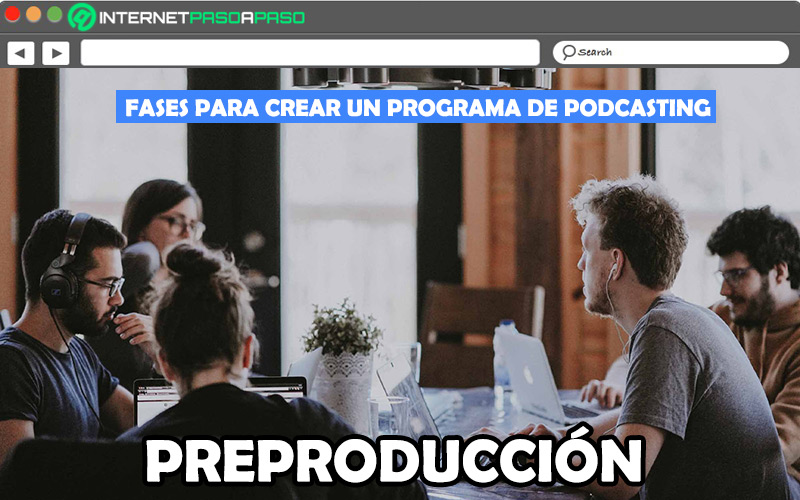
As its name indicates, it is the stage before starting the production of the podcast. Basically, it is the first phase or the “preparation” period in which you have to choose the theme of the on-demand audio program, fix its structure, establish its style, build its most appropriate name, design the logo that will differentiate it from the rest, define the potential audience, etc.
Therefore, the pre-production step is transcendental for ensure optimal conditions for carrying out the program and avoid subsequent errors or forgetfulness that can minimize its quality. Apart from the above aspects, it is also necessary to form a work team, determine the budget and financing, organize the recordings to be made, create the content, set the objectives and design the final product.
Production
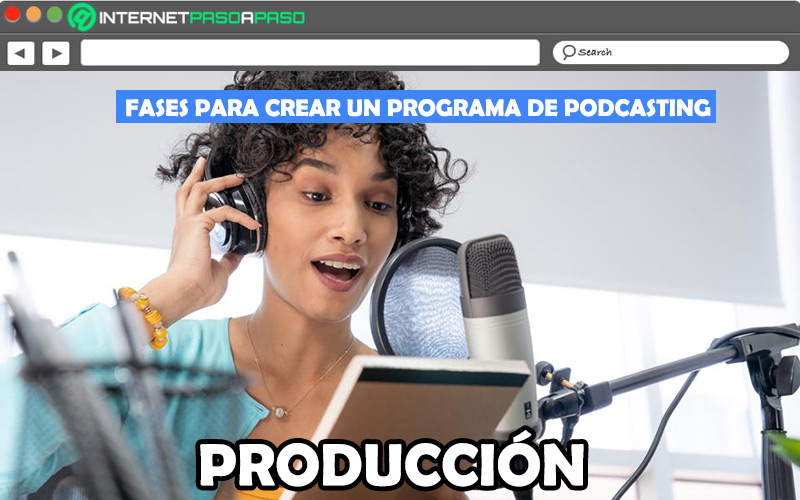
Briefly, the production phase is defined as the one in which the issuer is in charge of make the audio program, that is to say, starts the recording of the podcast in question. At this point, it is ideal to use high-quality hardware and powerful software to guarantee the highest possible quality to listeners.
For example, in the case of hardware, it is recommended to establish a division between the material necessary to create a test podcast and the most relevant material to make a much more professional program that will finally be presented to the public. For the latter, it is recommended to use a computer with headphones and a microphone along with a mixing desk to improve audio quality.
In the case of software, there are numerous platforms to create podcasts. Among them, it is ideal to choose the programs that are multi-platform and display a simple interface to handle and with efficient operation. Apart from guaranteeing a remarkable freedom both to make the recording and to be able to make a quality edition.
post production
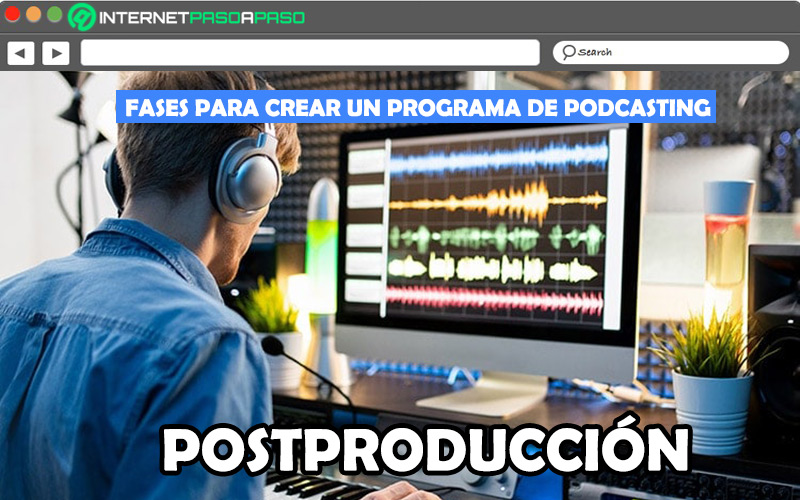
Finally, the post-production stage is based on editing and assembling the audio program built during production. Although many overlook this phase, the truth is that it is the most important of all and it is even pertinent to dedicate much more time to it than to the production itself, in order to give a touch of quality and originality to your audio content.
Consequently, you should put in as much effort as possible, elevate your creativity, and unleash your passion for podcasting. In addition to this, it is also substantial use editing software that contains great features to improve the quality of your audio tracks, reduce the length of awkward pauses, remove annoying sounds, add music, add sound effects and export the podcast in widely used formats.
Best platforms to host a podcast
Yes, still you don’t know which is the best solution to store and distribute your audio program on demand, we invite you to discover 5 high quality platforms so that you choose one of them and do not hesitate to start in this world.
Let’s see below:
Captivate.fm
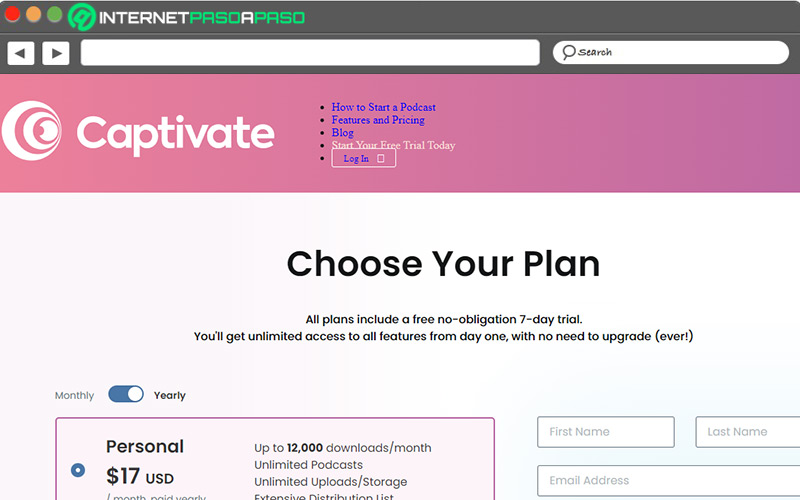
Stands out as one of the most efficient podcast hosting platforms, since it has a long history in the industry. There, you will be able to make use of a high-quality podcast player, Get advanced, easy-to-understand analyticsadd as many members as you want, and even create private podcasts.
buzzsprout.com
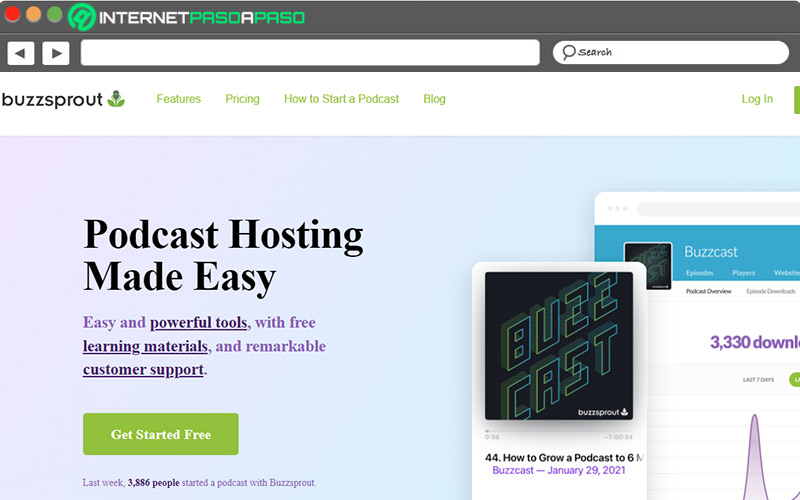
It is a platform that has a built-in transcription function and provides advanced statistics. Which was created with the aim of doing podcasting simpler and without limitations. In addition, it contains excellent tools so that your episodes exhibit the best audio quality and is compatible with Spotify, Apple Podcasts, Google Podcasts, Castbox, Overcast, Alexa, etc.
RSS.com

Being one of the pioneers in the field of podcasting, is one of the most efficient solutions for hosting podcasts. On this site, podcasters can host unlimited episodes, create a custom URL of your RSS feed, view high-quality analytics, and start setup for free before publishing anything. It allows upload content on Amazon Music, Spotify, Apple, Google and Samsung Podcasts.
ResonateRecordings.com
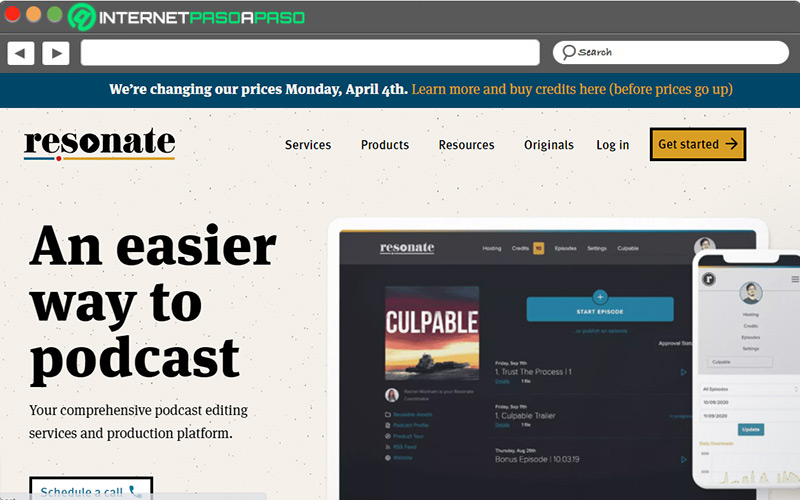
Through this hosting platform, you can find countless tools to specify professional production and editing of your audio program. Thus, beyond hosting the podcasts, has a built-in player that allows you to track how your audience listens to you and even get analysis to improve your programs.
Transistor.fm
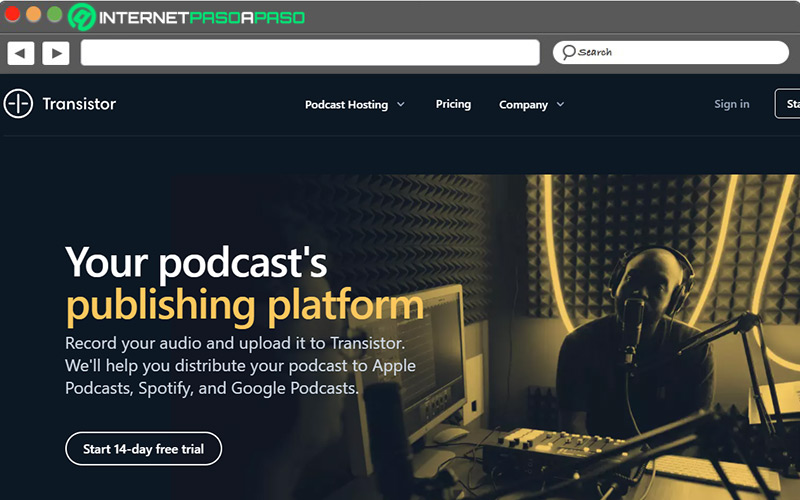
This is one of the newest hosting platforms of all that used to distribute your audio programs on Google Podcasts, Apple Podcasts and Spotify. Although not entirely free, it does offer a 14-day free trial to make use of its various tools and statistics. It is also useful for choosing a design and generate your own website for your program automatically.
streaming